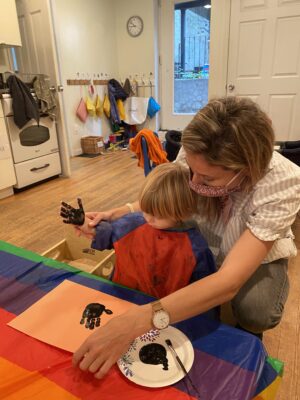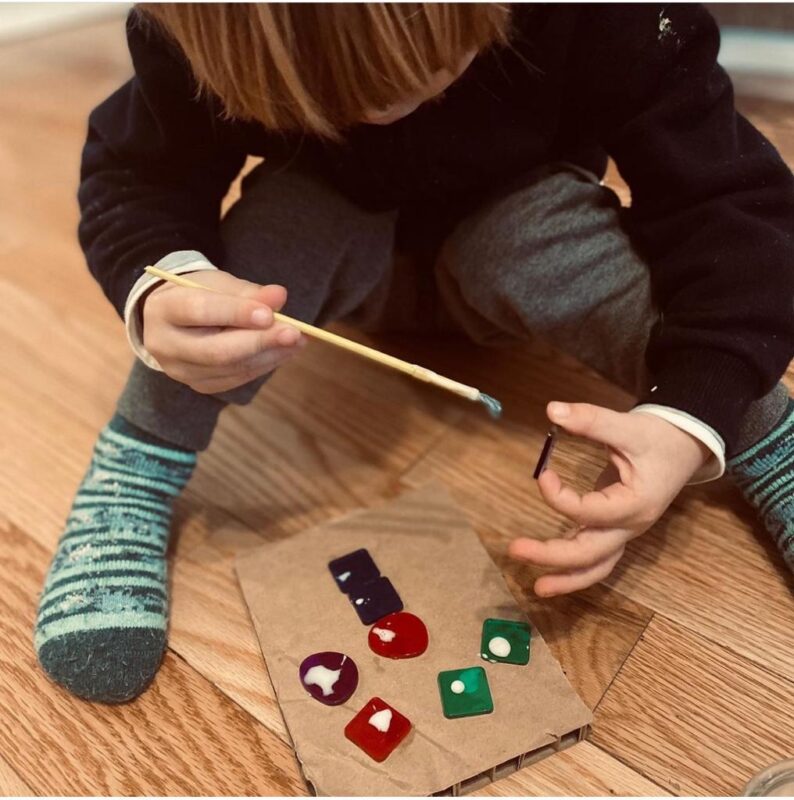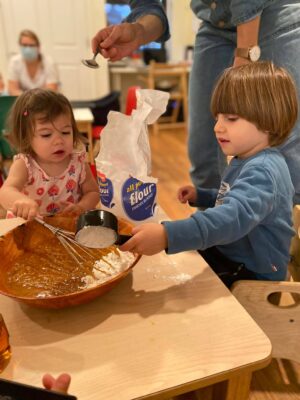Krippe
KinderHaus is excited to announce a curriculum for our youngest children, ages 6 months to 2 years old
 At the heart of our philosophy is the belief that children learn best by social interaction. We provide a developmentally-appropriate curriculum which fosters the children’s natural curiosity and is targeted towards our youngest KinderHaus members’ specific needs.
At the heart of our philosophy is the belief that children learn best by social interaction. We provide a developmentally-appropriate curriculum which fosters the children’s natural curiosity and is targeted towards our youngest KinderHaus members’ specific needs.
The brand new KinderHaus Krippe curriculum is created for our littlest KinderHaus children who will enjoy playing and learning together in a small group environment, with especially trained teachers who focus on and are responsive to the individual personalities, learning styles, and formative experiences. Children will spend their days with communal play, singing, art and movement. The developmentally-appropriate approach includes gentle phasing into the school environment and a close cooperation between teachers and families.
This program is for parents who seek a high-quality, family-oriented German Immersion program for children from 6 months old.
Sign up for our Newsletter to stay updated on everything about KinderHaus.
‘Startklar’ from the beginning
Socialization
The positive experience of a group environment encourages children to build lasting friendships and close relationships to role models.
Playing is Learning
The cognitive development of young children is supported during mindful play situations with opportunities to experiment with a variety of scientific phenomena such as cause & effect or object permanence.
Language
Giving children a head start in becoming truly bilingual is achieved through daily language activities, including story-telling, singing, rhymes and picture books.
Movement
Allowing a safe space for young children to move and explore their physical strengths indoors and outdoors is a vital aspect of the KinderHaus teaching approach, which helps children to grow up healthy and strong.
| 8:30 - 9:30 AM | Flexible Drop Off Period, Arrival at KinderHaus and Free Choice Movement and Play Offene Bringzeit, Ankommen im KinderHaus mit Spiel- und Bewegungsangeboten |
| 9.30 -10.00 AM | Snack |
| 10.00-10.20 AM | Circle Activities (Music, Story time) Gemeinschaftszeit (Musik, Geschichtenzeit) |
| 10.20- 11.15 AM | Small Group activities (outdoor play, art, movement) Spiel – und Lernangebote (Gartenzeit, Kunst, Bewegung) |
| 11.15- 11.30 AM | Preparation for Lunch, Bathroom and Clean Up Vorbereitung fuer das Mittagessen, Badezimmerzeit und Aufraeumen |
| 11.30- 12.15 PM | Lunch Mittagessen |
| 12.15- 14.15 PM | Bathroom, Story time, Nap and Quiet time Badezimmerzeit, Geschichtenzeit, Mittagsschlaf und Ruhezeit |
| 14.15- 15.00 PM | Waking –up, Movement, Art/Sensory Table Activities Aufwachen, Bewegung, Kunst, Tast- und Wahrnehmungsspiele |
| 15.00-15.15 PM | Goodbye Circle Gemeinsames Verabschieden |
PreSchool
Through a wide range of activities we help children gain confidence as they become active learners, adapt to collaborative group experiences, and learn to respect the feelings of others. We believe that children’s play is an expression of intelligence and growth, and that young children learn best through hands-on, concrete experiences.
The PreSchool program’s age-specific curriculum includes:
Literacy and Language: phonological awareness, comprehension, concepts about print, and alphabet knowledge, story telling.
Mathematics and Science: classification, spatial thinking, number observation and experiments, shapes, counting and cardinality.
Social studies: different cultures, diversity, people and places, our environment.
Creative and Dramatic Arts: role play, dramatic play, colors and painting.
Music and Movement: rhythm, clapping, songs and melody, instruments.
Emerging Literacy & Language
At Kinderhaus children express themselves and build vocabulary during story and picture book times. Language and positive communication is valued as a positive way to resolve problems and issues in the classroom. Children are acquiring language skills, through active play and learn to become effective communicators. Teachers guide each child to ensure the development of the following pre-reading and pre-writing skills:
-
Visual discrimination
-
Auditory discrimination
-
Memory
-
Use of oral language
-
Ability to answer questions and follow verbal directions
-
Ability to remember previous events and apply that information
Mathematics and Science
 Mathematics helps us with ordering and thinking about the world. Mathematical concepts develop through hands-on use of materials such as manipulatives and puzzles. Science and math concepts are best explored through tactile experiences. Children are establishing the foundation of early scientific principles by engaging in activities of observation, experimenting and comparing. This results in our students developing a love and respect for nature as well as a better understanding of the world around them. When children cook or bring snow into the room to watch it melt, they are gaining an understanding of changes and properties. Other science activities include using magnets, color wheels, and magnifying glasses. Children go outdoors daily to observe seasonal changes, in addition to learning about day and night, the clouds and stars. Their observations lead to “scientific” predictions and eventually to finding ways to record their observations.
Mathematics helps us with ordering and thinking about the world. Mathematical concepts develop through hands-on use of materials such as manipulatives and puzzles. Science and math concepts are best explored through tactile experiences. Children are establishing the foundation of early scientific principles by engaging in activities of observation, experimenting and comparing. This results in our students developing a love and respect for nature as well as a better understanding of the world around them. When children cook or bring snow into the room to watch it melt, they are gaining an understanding of changes and properties. Other science activities include using magnets, color wheels, and magnifying glasses. Children go outdoors daily to observe seasonal changes, in addition to learning about day and night, the clouds and stars. Their observations lead to “scientific” predictions and eventually to finding ways to record their observations.
Social Studies
Children begin to learn about their classroom community, its routines, rhythms, and rules. They begin to understand how to work together as a group. By sharing their different backgrounds, holiday traditions, and exploring a variety of cultural and ethnic cooking activities, stories, music, and dances, children discover the many wonderful differences and common threads that bind individuals together.
Art
Creating, experimenting, and learning go hand in hand. Art is a form of communication that comes naturally to children. It is experiential and exploratory and does not always need to be planned or purposeful. Students have opportunities to be creative every day, using a variety of materials including paint, markers and crayons, clay and collage. Art activities develop the following skills:
- Fine motor coordination
- Awareness of color, shape, size, and texture
- Understanding of spatial relationships
- Awareness and understanding that symbols have meaning
- Developing self-expression and emotional outlets
Music
Music is to make, to use, and to enjoy, and the children engage in musical activities daily. The children sing or play rhythm instruments and listen to a wide range of music and are taught German songs by a specialized Early Childhood music teacher. As children sing, do finger plays, or imitate animals in a song, they use their imaginations and improve coordination. They develop an appreciation for the patterns and the musical variety produced by rhythms, melodies and musical instruments. They also simply learn to love music and find joy in singing together.

